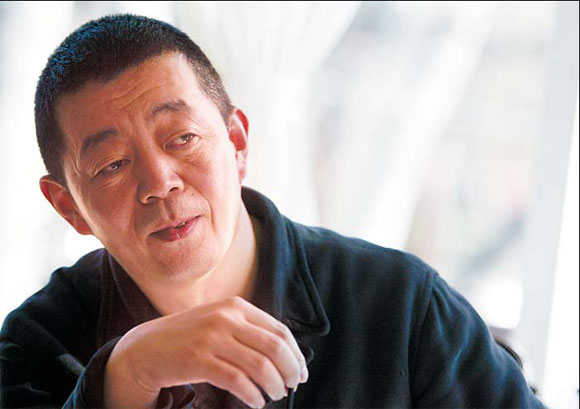'I have a dream'
|
Gu Changwei's latest film chronicles the lives of ordinary people with extraordinary aspirations. Guan Xin |
Wang Cailing is middle-aged and plump with buck teeth and wrinkled skin. She has sparse hair and eyebrows, and wears a serious, grim expression. Yet this woman has a beautiful voice and dreams of singing at the Paris Opera some day. But in a small city in North China in the early 1980s, Wang encountered one frustration after another.
Her friend Zhou Yu is a fat factory worker with long, greasy hair. He wears a James-Dean-style jacket all day, though perched on a bike. He dreams of singing fame, too.
And then there is Huang Sibao, who believes he is the next Vincent van Gogh. He keeps applying to an art academy in Beijing, despite being rejected five times.
Another art lover in this small city is Hu Jinquan, a man obsessed with ballet, unusual for a small city's residents in the early 1980s. Known for his camp ways, Hu describes himself as a fishbone in the city's throat.
Such are the characters of Gu Changwei's And the Spring Comes (Li Chun), the top cinematographer's second directorial work, which will be premiered in the country in early April.
"I am not the kind of person with burning ideals," he tells China Daily. "But deep inside, I do have a little idealism, which makes me admire those who chase their dreams. However unsuccessful they may be by popular standards, idealists are great in my eyes."
None of the characters in the movie realize their dreams. For example, Wang ends up as a street seller of mutton. Towards the film's end, however, is a scene that shows her singing an aria of Puccini in a grand theater.
Gu introduces this scene to underscore his appreciation for the dreamers. "I wanted to help Wang fulfill her dream," he says.
Gu was born into a teachers' family in Xi'an, Shaanxi province. His parents kept telling him he was an ordinary child in an ordinary family, and so should have reasonable aspirations. Hence, when in 1978 Gu saw a notice outside the Xi'an Conservatory of Music that the Beijing Film Academy was enrolling students, the 21-year-old lover of art did not feel much enthusiasm.
"If Xi'an had not been one of the examination sites, I would not have bothered taking the exam," he recalls.
But he had more luck than the characters in Spring. He was admitted to the school and befriended Zhang Yimou and Chen Kaige, who are now two of the most famous filmmakers on China's screen.
The shy young man graduated in 1982, two years before the happenings depicted in Spring. According to the policies then, only Beijing locals could stay in the capital, with the rest sent to film studios across the country. Gu returned to the Xi'an Film Studio and thought he would see Beijing only on business trips. The city, the Mecca for China's young art enthusiasts, seemed as remote to Gu as to his characters in Spring.
As was the norm then, Gu says, he was prepared to wait at least 18 years to be a cinematographer. But just three years later, he was handling the camera independently. In 1987, his former roommate Zhang Yimou made Red Sorghum (Hong Gaoliang), with Gu as the cinematographer. In 1994, Gu was nominated for an academy award for Best Cinematography for Chen Kaige's Farewell My Concubine (Bawang Bieji).
"The early 80s was just like Li Chun," Gu says. "The calendar tells you spring is coming. And, although around you still see scenes of winter, you can smell the spring; you know that change is coming soon."
The film's character Wang Cailing, played by Gu's wife Jiang Wenli, felt this too. Although she and her friends have to contend with humiliation and misunderstanding, they are able to afford a train ticket to Beijing and try their luck outside art academies, conservatories and opera houses.
The movie's premise would be hard to imagine in the 1970s, when even the amount of oil and rice one could have every month was set by the government.
"Individuality was not encouraged at that time," Gu says. "But in the 80s, with the reforms and opening up, the possibilities expanded."
Although set in the decade following the early 1980s, Gu says the film explores many issues that are still relevant today, such as whether society's tolerance of individuality develops with the economy, and what is life like for millions of struggling artists trying to break through in Beijing.
Even today, hundreds of people can be found squatting outside the gates of the Beijing Film Studio to work as extras; film and drama academies see hundreds of applicants from hopefuls every year. In the painters' village in Beijing's suburbs, aspiring artists wait for the day their works will adorn art galleries.
Although the characters in Spring do not enjoy a happy story ending, Gu insists that dreaming, in any era, is a beautiful thing.
"Everyone has the right to dream, even those at the very bottom of the social ladder," he says. "But it's also okay if you choose to lead an ordinary life. The good thing of our times is that you can make your own choices."
Compared to the 1980s and early 90s, young talents have more opportunities today, Gu says.
Yet, as the opportunities expand, so do people's expectations, Gu points out.
Gu is confident his film will move viewers. "The story is about common people and their uncommon dreams," he says. "This is something we can all relate to."
(China Daily 03/18/2008 page19)















